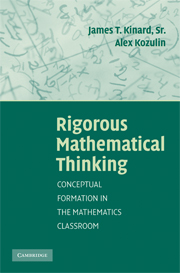Book contents
- Frontmatter
- Contents
- Introduction
- 1 Culture of Mathematics
- 2 Goals and Objectives of Mathematics Education
- 3 Vygotsky's Sociocultural Theory and Mathematics Learning
- 4 Mediated Learning and Cognitive Functions
- 5 Mathematical Concept Formation and Cognitive Tools
- 6 RMT Application, Assessment, and Evaluation
- Conclusion
- References
- Index
3 - Vygotsky's Sociocultural Theory and Mathematics Learning
Published online by Cambridge University Press: 05 June 2012
- Frontmatter
- Contents
- Introduction
- 1 Culture of Mathematics
- 2 Goals and Objectives of Mathematics Education
- 3 Vygotsky's Sociocultural Theory and Mathematics Learning
- 4 Mediated Learning and Cognitive Functions
- 5 Mathematical Concept Formation and Cognitive Tools
- 6 RMT Application, Assessment, and Evaluation
- Conclusion
- References
- Index
Summary
Mediated Character of Human Learning
For a long time the predominant model of school learning was that of direct acquisition (see Sfard, 1998). Children were perceived as “containers” that must be filled with knowledge and skills. The major disagreement among educators was only in the degree of activity expected of the child. More traditional approaches portrayed the child as a rather passive recipient of prepackaged knowledge provided by teachers, whereas Piagetians and other “constructivists” expected children to be independent agents of knowledge acquisition. In a time it became clear that the acquisition model is insufficient both theoretically and empirically. On the one hand, children proved to be much more than passive recipients of information; on the other hand, students' independent acquisition often led to the entrenchment of immature concepts and “misconceptions” as well as a neglect of important academic skills. A search for an alternative learning model brought to the fore such concepts as mediation, scaffolding, apprenticeship, and design of learning activities.
Vygotsky's (1986, 1998) theory stipulates that the development of the child's higher mental processes depends on the presence of mediating agents in the child's interaction with the environment. Vygotsky himself primarily emphasized symbolic tools-mediators appropriated by children in the context of particular sociocultural activities, the most important of which he considered to be formal education. Russian students of Vygotsky researched two additional types of mediation – mediation through another human being and mediation in a form of organized learning activity (see Kozulin, Gindis, Ageyev, and Miller, 2003).
- Type
- Chapter
- Information
- Rigorous Mathematical ThinkingConceptual Formation in the Mathematics Classroom, pp. 50 - 72Publisher: Cambridge University PressPrint publication year: 2008

